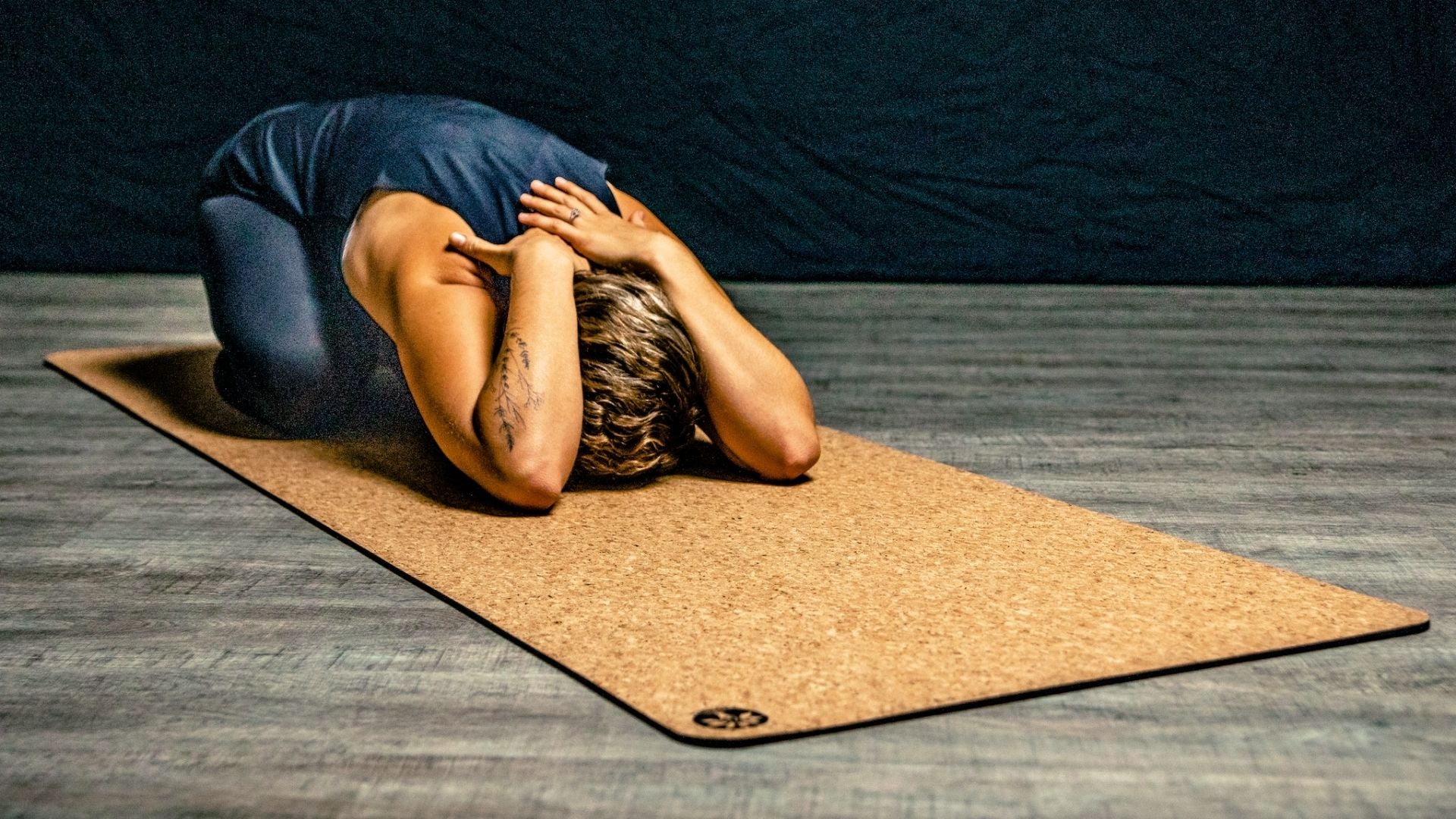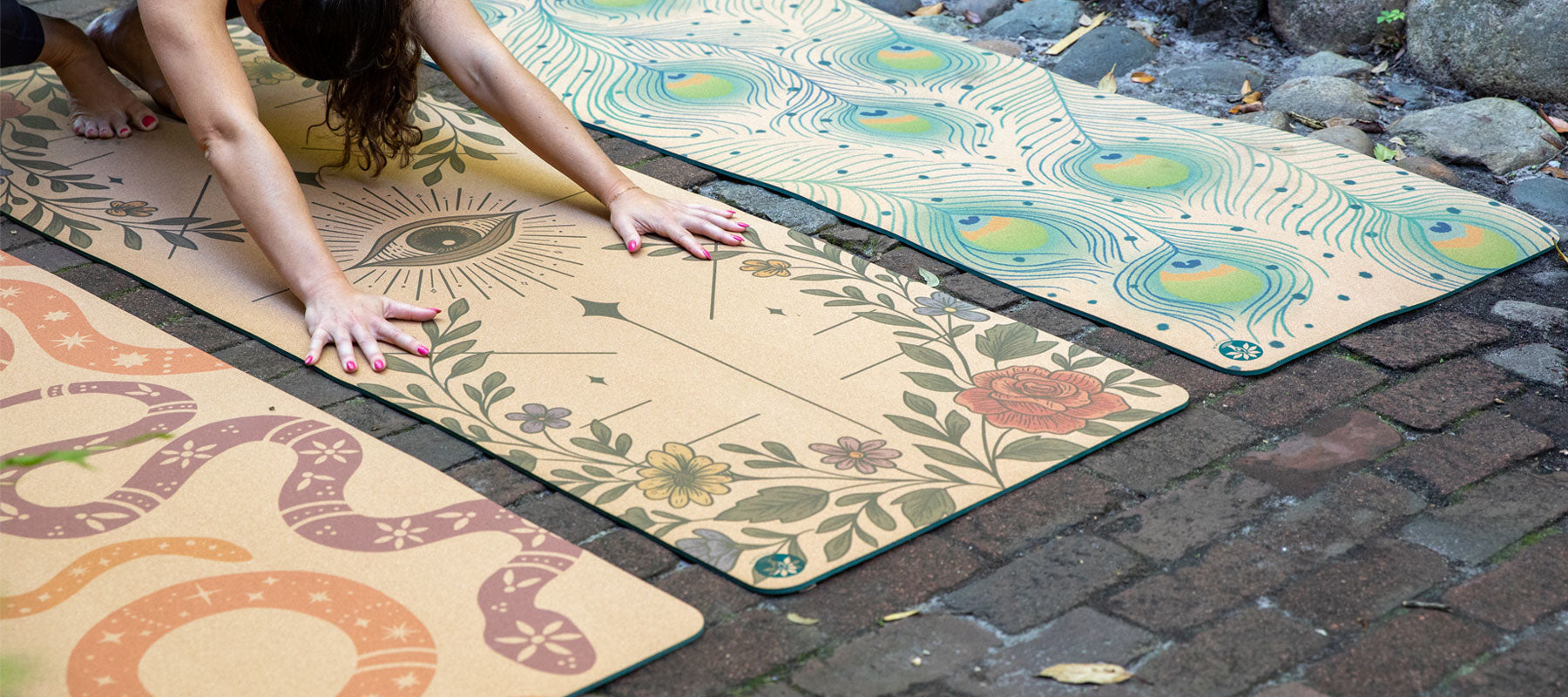Does this sound familiar? You’re exhausted. I mean, really tired. All day you’re trudging through. Cup of coffee here, handful of chocolate there. Trying to get by until that blissful moment when you get to slip into your beautiful bed once again.
It finally comes and … nothing. You’re wide awake. No sleep. No relief. Staring at the ceiling. Hour after hour.
You may be miserable, but you’re certainly not alone.
Science shows us again and again that adults need at least … and we’re talking bare minimum … seven hours of sleep each night in order to be healthy, happy, and generally well. But that’s not happening regularly for around 35% of us.
And poor sleep is more than an annoying inconvenience. Your risk of developing depression goes up from 14.6% to 22.9% when you don’t get your seven hours; diabetes from 8.6% to 11.1%; and heart attack from 3.4% to 4.8%.
Solution? Maybe a few more sun salutations…
Here’s How Yoga Helps You Sleep: Movement & More
Johns Hopkins Medicine boils it down this way: “We have solid evidence that exercise does, in fact, help you fall asleep more quickly and improves sleep quality.”
Essentially, movement = zzz’s.
While yoga checks off that exercise box … it’s much more. Instead of thinking of yoga as a single sleep-inducing tool, maybe it’s better to think of it like an insomnia toolbox.
1. Yoga Offers Cardio
Perhaps we’ve found the reason why a good heart-pumping power Vinyasa class is so addicting even if it’s hard: the science of cardio.
Aerobic exercise has been shown to decrease the time it takes to fall asleep, lengthen the time you stay asleep, and improve the quality of sleep. Big bonus: cardio also reduces fatigue while you’re awake. Sleepier at night; more energized during the day … yes, please!
2. Yoga Offers Relaxation
90 people were stressed. Researchers put them into two different groups: one did yoga for 16 weeks. The others abstained for 8 weeks and then practiced for 8 weeks. The 16-weekers found “significant reductions in stress and all psychological health measures.” Unsurprisingly, once the 8-weekers jumped on the yoga train, same thing happened.
All this stress reduction is useful considering both the Mayo Clinic and WebMD put stress first on the list of insomnia causes.
Think more yin, more restorative, more Savasana. By the way, The Sleep Foundation highlights Legs Up the Wall and Lying Butterfly (a.k.a. Supta Baddha Konasana) as major relaxers pre-bedtime.
3. Yoga Offers Breathing Skills
Breath is at the heart of our practice. Sometimes instructors simply remind you to breathe; sometimes they go over specific breathing exercises. Those exercises can be used before bed to soothe the mind and body into peaceful rest.
Harvard Health particularly points out the sleep benefits of Ujjayi Breath (the one yoga instructors compare to the sound of the ocean). Breathe in deeply through your nose. Breathe out through your nose (mouth closed) while slightly constricting the back of your throat to make the wave sound.
4. Yoga Offers Holistic Wellness
Good yoga communities focus on holistic wellbeing. It’s not only what you do on your mat, but also what you consume. Here are two sleep-enhancing examples:
- Magnesium: Half of Americans aren’t getting enough magnesium—problematic considering it aids in calming the mind, easing muscle cramps, and promoting restful sleep. Magnesium-rich foods: pumpkin seeds, nuts, spinach, black beans, dark chocolate, and avocado.
- Lavender Oil: As one of the most well-studied essential oils, research points to lavender’s effectiveness in reducing stress and improving sleep quality.
The #1 Rule For Yoga and Sleep: It’s All About Timing
All of this yoga-sleep goodness can go wrong quickly if you don’t understand one thing: timing is everything.
- For some people, evening aerobic exercise increases insomnia. Choosing heart-pumping classes in the morning and meditative classes in the evening may keep you in a natural wakefulness/sleepiness rhythm.
- Other people, though, find increasing their body temp through aerobic activity in the afternoon or evening triggers a positive fatigue a couple hours later as their body naturally cools down … making it easier to sleep.
Everyone is different, so take a few weeks to experiment.
It’s A Practice, Not a Pill
I’ll leave you on this. Yoga isn’t a pill you pop for instant insomnia relief. It’s all about the practice.
One study on the effects of yoga for sleep in older adults (a population more plagued with insomnia) found those who had been doing daily yoga for two years or more saw great improvement compared to those who didn’t.
And remember those 90 stressed out study participants? They didn’t just take one class and sleep like babies. It was regular practice for weeks that brought change.
So, find your yoga community. Experiment with class type/time of day. Chill in Supta Baddha Konasana for a few extra minutes. Eat more magnesium-rich foods. Keep breathing and sleep on!
P.S. If you are blessed with a yoga studio that offers an outdoor practice space, take advantage. Exposure to the natural light/darkness cycle of the day is key for regulating your circadian rhythm. Double win!
Learn more about the benefits of sleep HERE.
Taylor Duvall
Taylor DuVall is a creative: writer, poet, editor, musician, and book publisher. After graduating with an English degree from the University of Nevada, Las Vegas, Taylor took her wordsmith skills abroad as a freelance writer and editor. Traveling from place to place, she wrote and edited online content for small businesses, largely in the health and wellness field. Today, Taylor lives in Charleston, South Carolina, where she continues to write and get involved in her community. When not in her office, you can find her by the ocean, in an antique shop, on a yoga mat, or with her nose in a book.
Sources:
https://www.ncbi.nlm.nih.gov/pmc/articles/PMC5786912/
https://www.ncbi.nlm.nih.gov/pmc/articles/PMC3667430/
https://www.ncbi.nlm.nih.gov/pubmed/29166771
https://www.ncbi.nlm.nih.gov/pmc/articles/PMC5803038/
https://www.ncbi.nlm.nih.gov/pmc/articles/PMC4443384/
https://www.hopkinsmedicine.org/health/wellness-and-prevention/yoga-for-sleep
https://www.hopkinsmedicine.org/health/wellness-and-prevention/exercising-for-better-sleep
https://www.sleepfoundation.org/articles/connection-between-yoga-and-better-sleep
https://www.webmd.com/sleep-disorders/news/20120119/insomnia-problem-needs-taken-seriously#2
https://www.sleepfoundation.org/articles/how-does-exercise-help-those-chronic-insomnia
https://www.webmd.com/sleep-disorders/news/20170202/time-outdoors-may-deliver-better-sleep#1


